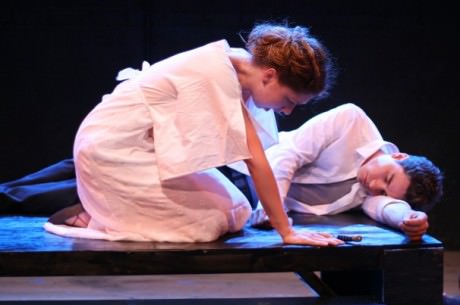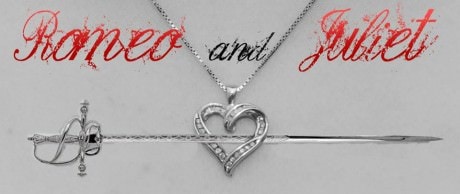Cross-gender casting of the classics can be sometimes a silly stunt, sometimes an earnest bemusement, and sometimes—as in Romeo and Juliet as staged for Capital Fringe by We Happy Few Productions—an astonishing fresh take for our times, a rereading that rewards us with resonance and relevance we were not aware of before.

Academics have had a field day deconstructing cross-dressing in Shakespeare. Oh my. So much self-absorbed abstraction, so much empty convolution. Publishing that keeps professors from perishing but that will annihilate a theater-lover’s pulse in a heartbeat.
We Happy Few’s gender re-think is not only brilliantly plain and simple; it’s richly evocative: In this stripped-down (90-minute) version, all the parts are played by male actors save the part of Juliet. It’s just girly, impulsive Juliet up against a boisterous crew of seven guys. Before the performance begins on a bare-bones stage with spare set pieces, we get a heads-up program note about this conception’s genesis from Director Hannah Todd:
In this world, it’s not just that men are the people in political power or that men have the ultimate say over who their daughters marry or who will be their wives. It’s that the wills of men—their passions, their pettiness, their jealousies, their proclivities, their whims, their violence, and their wishes—drive everything. Women’s lives are, as a rule, completely at the mercy of men.
You understand that Todd is talking here about long-ago Verona, right? No resemblance to today?
Riiiight.
Todd’s annotation goes on:
However, the men are also prisoners of the unstable world their free reign creates. There is a ubiquitous undercurrent of machismo, of violence, manifested in the feud that underlies every interaction. The world is a powder keg—at the slightest provocation, it explodes.
Such an anachronism! Hard to recall there was ever a world as weird as that!
So what, you may well ask, is the payoff of Happy Few’s recast-the-past gambit? Well, happily, plenty.
At the opening, we see all the male actors standing stock still around the stage in dim light. And they all seem vaguely menacing as wan, fair Juliet speaks the prolog in a spotlight. Abruptly gang warfare breaks out—choreographed to within an inch of its life by Casey Kaleba—and it’s thug on thug, Montagues against Capulets, the cockfight that keeps on keeping on for no reason ever given. They do it just because and—as becomes apparent—just because it’s what men do to be the men.
Academics have had another field day trying to suss out the overarching theme of R&J. There sort of isn’t one, actually, which bothers no one except academics. But We Happy Few has found a profound one: In this vision of the play, everything that takes place happens in a context of, and largely because of, endemic male-male aggression—fisticuffs, weapons, body takedowns, you name it—plus all the latent homoeroticism that lethally underlies it. Even when the aggression is not aimed at foes but is counterfeit affection among BFFs, there’s enough butt slapping and feigned buggery here to keep an all-boy dormitory at attention.
And there are more surprises:
All the male actors play macho, and two double as Nurse and Lady Capulet. The fact that these female characters are being played by the same actors who played male characters produces indelible and stunning effects. For instance when Lord Capulet bellows and rages, Nurse simpers, and Lady Capulet cowers—in what feels as close to a domestic violence episode as ever I’ve seen emulated onstage—it is almost shocking to see the same two actors, who heretofore among men were at one another’s throats, collapse into women’s fear and trembling in the face of their abuser.
I dare not give anymore away. See this production if you possibly can. It’s one for the annals of theater history. Besides which, it’s a helluva good show.
Romeo and Juliet has two more performances tonight and tomorrow at 7:30 PM at Source Theatre – 1835 14th Street, NW, in Washington, DC. For performance times and to purchase tickets, visit the show’s Capital Fringe page.
LINKS
2013 Capital Fringe Show Preview: ‘Romeo and Juliet’ by Kiersten Dittrich.
Carolyn Kelemen’s review on DCMetroTheaterArts.





